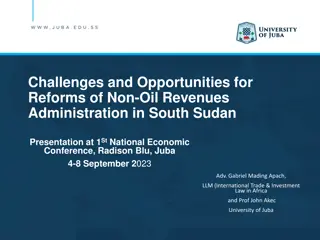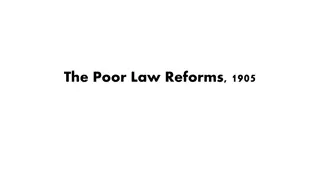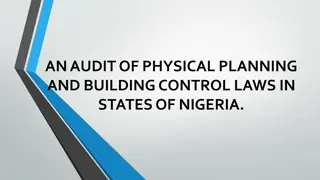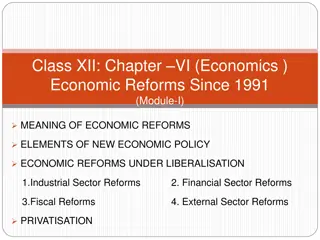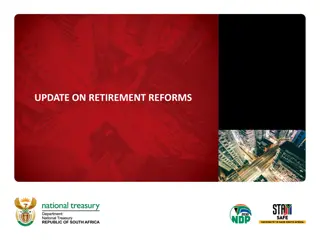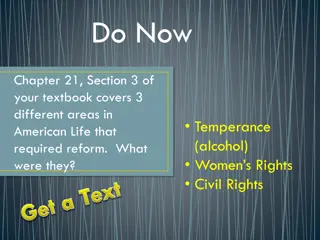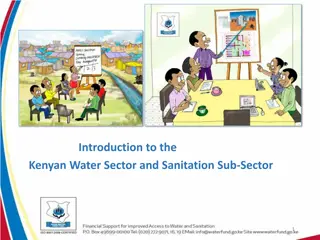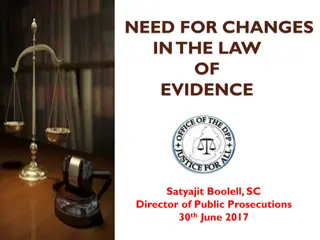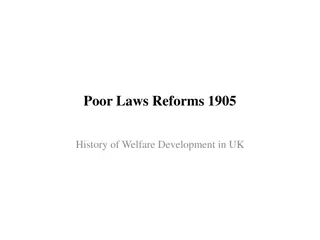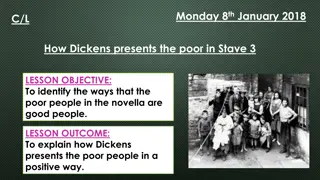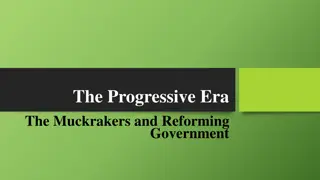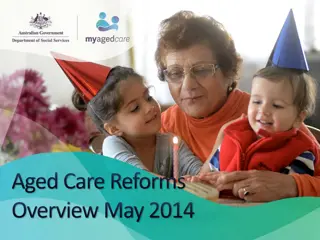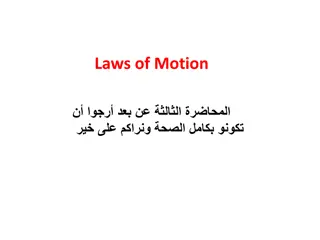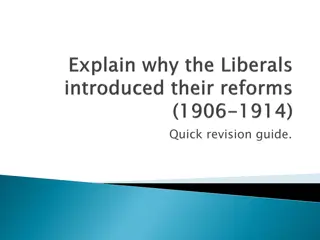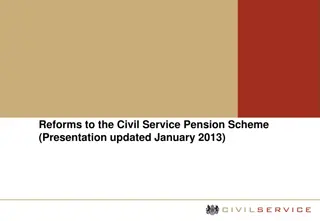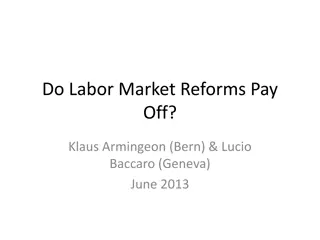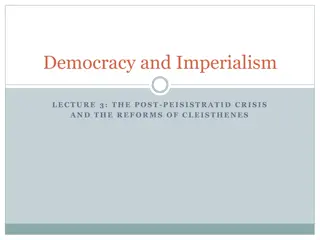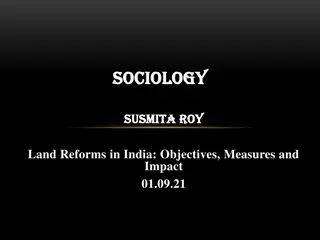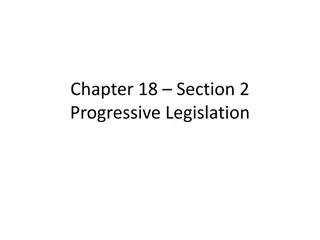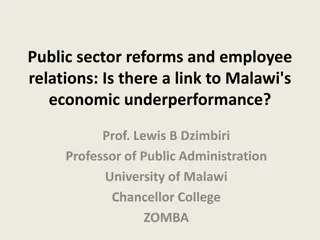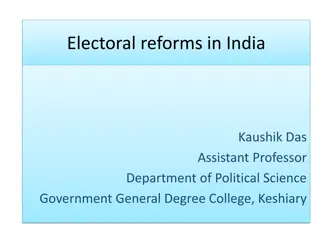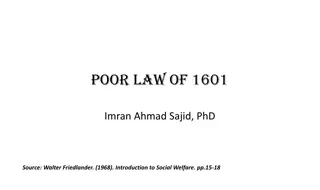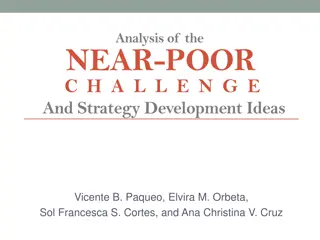Challenges and Opportunities for Reforms of Non-Oil Revenues Administration in South Sudan
The presentation highlights the reliance on oil revenues in South Sudan and the need for reforms in non-oil revenue administration. It discusses sources of non-oil revenue, factors hindering revenue mobilization, and opportunities for reforms to diversify the economy. The objectives of non-oil reven
3 views • 23 slides
Status of Family Laws in India: Hindu vs. Religious Minorities
The family and personal status laws in India vary between Hindu law and those pertaining to religious minorities. While Hindu law has seen extensive reforms, discriminatory provisions still exist. In contrast, laws governing religious minorities have undergone fewer reforms, leading to greater inequ
2 views • 4 slides
Overview of Federal Discrimination Laws in Employment
Federal discrimination laws protect employees from discrimination, harassment, and retaliation in the workplace based on various protected characteristics. Title VII, ADA, ADEA, EPA, Lilly Ledbetter Fair Pay Act, and GINA are key federal laws ensuring fair treatment of employees. These laws cover al
5 views • 42 slides
Financial Sector Reforms in India: An Overview
In the early 1990s, India witnessed significant reforms in its financial sector, addressing issues like lack of transparency, extensive regulation, and financial repression. Key reforms included setting up expert committees, reducing SLR and CRR, implementing prudential norms, and deregulating inter
0 views • 18 slides
The Hague Convention of 1993 and Its Impact on Philippine Laws on Intercountry Adoptions and Child Welfare
The Hague Convention of 1993 plays a significant role in shaping Philippine laws regarding intercountry adoptions and child welfare. This convention emphasizes principles like the best interests of the child, subsidiarity principle, and prohibition of improper gain. It guides policies and legislatio
0 views • 10 slides
The Poor Law Reforms of 1905: Addressing Unemployment in England
At the turn of the 20th century, England's working class, especially in mining regions, faced unemployment due to industry challenges. The Liberal party promised and initiated reforms, including replacing poor law unions, abolishing punitive relief, and introducing public assistance programs and soc
0 views • 16 slides
Recent Changes in Labour Laws and Code on Wages, 2019
The recent changes in labour laws involve the amalgamation of 44 laws into 4 codes, focusing on wages, occupational safety, industrial relations, and social security. The Code on Wages, 2019, aims to amend and consolidate laws related to wages and bonus, applicable to all employees in India. The Cod
1 views • 104 slides
Overview of Social Register of Mauritius and Marshall Plan against Poverty Reforms
The Social Register of Mauritius (SRM) is a crucial tool for registering and identifying the poor, aiding policy-makers in creating effective pro-poor policies. This overview of UNDP-supported anti-poverty reforms in Mauritius highlights the objectives and improvements brought about by SRM, addressi
0 views • 30 slides
Audit of Physical Planning and Building Control Laws in Nigerian States
This paper discusses the audit of physical planning and building control laws in various states of Nigeria, highlighting the responses and status of laws in different states. It covers the importance of effective laws in regulating construction activities, population growth impact, and the delegatio
4 views • 22 slides
Economic Reforms Since 1991: Liberalisation and Industrial Sector Reforms
Economic reforms initiated in 1991 under the New Economic Policy focused on liberalisation, privatisation, and globalisation to accelerate economic growth. Liberalisation involved deregulation of the industrial sector, abolishment of industrial licensing, reduction of public sector industries, de-re
0 views • 9 slides
Update on Retirement Reforms in South Africa
South Africa has been implementing retirement reforms focusing on enhancing governance, extending coverage, encouraging preservation, and simplifying taxation since 2012. The latest phase includes a two-pot system, auto-enrolment, and efforts to address challenges like inadequate benefits and poor f
0 views • 12 slides
Progressive Reforms and Social Movements in American Life
The Progressive era in American history saw significant reforms in three key areas: Temperance (alcohol), Women's Rights, and Civil Rights. Various laws, organizations, and individuals played crucial roles in driving these reforms, such as the 18th Amendment, the National Woman's Party, the 19th Ame
0 views • 7 slides
Evolution of the Kenyan Water Sector: Reforms and Innovations
The Kenyan water sector has undergone significant reforms and institutional changes over the years. Beginning with the establishment of the Ministry of Water in 1974, followed by the enactment of the Water Act 2002 and subsequent reforms, new institutions such as WASREB, WSBs, WRMA, and WSPs were cr
0 views • 15 slides
Structuration Analysis of Central Government Accounting Practices and Reforms in Emerging Economies: A Study from Nepal
Delve into the nuances of central government accounting practices and reforms in emerging economies, focusing on Nepal. The study explores why key stakeholders resist externally-driven changes, investigates the unintended consequences of reforms, and highlights the role of organizational actors in s
0 views • 21 slides
Need for Changes in the Law of Evidence: Perspectives and Reforms
Information by which facts are proved forms the essence of the law of evidence, regulating how facts are established in courts. This article discusses the exclusionary ethos, statutory reforms, challenges with hearsay evidence, and examples of reforms from different countries like England, Wales, Au
0 views • 18 slides
Evaluation of Labour Reforms 1945-51 and Their Impact on Poverty Alleviation
Following their landslide victory in 1945, the Labour Government under Clement Attlee implemented a series of reforms aimed at addressing poverty in post-WWII Britain. The Beveridge Report highlighted the giants of poverty - Want, Disease, Idleness, Squalor, and Ignorance - serving as the blueprint
0 views • 29 slides
History of Welfare Development in UK: Workhouses and Outdoor Relief
During the 17th and 18th centuries, workhouses and outdoor relief systems in the UK faced challenges in providing effective assistance to the poor. Initiatives like training the poor in various skills and contracting paupers for work failed to yield economic success. Criticism arose due to mistreatm
0 views • 7 slides
History of Poor Laws Reforms in the UK (1905) - Development of Welfare
In 1905, the Liberal Party in the UK promised reforms for the poor laws and aid for the unemployed. A Royal Commission was appointed to address the distress caused by mass unemployment, with key figures like Beatrice Webb and Sidney Webb playing significant roles. This period marked a crucial turnin
0 views • 10 slides
Dickens' Positive Portrayal of the Poor in Stave 3
In Stave 3 of the novella, Charles Dickens portrays the poor in a positive light, showcasing their hard work, jovial nature, and sense of community on Christmas Day. Through various quotations and scenes, Dickens challenges the stereotype of the poor being bad, emphasizing their resilience and human
1 views • 5 slides
Family Laws and Marriage Legalities in Pakistan
The legal system of Pakistan blends English common law and Islamic law, influencing various aspects such as commercial and personal laws. Family laws in Pakistan are a mix of codified and customary laws, with different laws applicable to different religious communities. Specific laws govern marriage
0 views • 21 slides
Uncovering the Progressive Era: Muckrakers and Government Reforms
Journalists like Lincoln Steffens, Jacob Riis, Upton Sinclair, and Ida Tarbell played crucial roles during the Progressive Era by exposing political corruption, poor living conditions, and unfair business practices, leading to significant reforms in government and society.
0 views • 15 slides
Overview of Aged Care Reforms in May 2014
Aged Care Reforms in May 2014 introduced significant changes to the aged care sector in Australia. The reforms aimed at providing quality care for older Australians, reducing red tape, and enhancing services such as Home Care Packages, MyAgedCare, and the Australian Aged Care Quality Agency. Changes
0 views • 45 slides
Early Childhood Education and Care in Croatia: Overview and Reforms
Early Childhood Education and Care (ECEC) in Croatia has evolved over the years with reforms targeting parental leave, family benefits, and preschool programs. The system includes nurseries, kindergartens, and preschools, with public providers dominating. Recent reforms have introduced quality stand
0 views • 19 slides
Understanding Newton's Laws of Motion
Dynamics is governed by Newton's three fundamental laws of motion. These laws, formulated by Newton, describe the behavior of objects in motion and at rest. Key terms such as mass, weight, momentum, force, and inertia are crucial in understanding these laws. Rigid bodies, which consist of fixed part
0 views • 22 slides
Welfare Reforms in the 19th Century: A Historical Overview
In the 19th century, poverty was often blamed on individuals, leading to a laissez-faire approach by the government. Key figures like Charles Booth and Seebohm Rowntree conducted insightful studies on poverty, highlighting the need for welfare reforms. The emergence of genuine concern for the poor a
0 views • 8 slides
The Fall of the Roman Republic: Turmoil, Reforms, and Caesar's Ascendancy
The Roman Republic faced internal strife due to the rich-poor divide, loss of small farms, and political corruption. Failed reforms by the Gracchus brothers led to military involvement in politics, culminating in Julius Caesar's rise to power as dictator for life, ushering in significant changes to
0 views • 21 slides
Overview of Civil Service Pension Scheme Reforms
Explore the recent reforms in the Civil Service Pension Scheme, covering changes in contributions, introduction of a new pension scheme, reasons for the reforms, current scheme details, and the transitioning stages. Understand the impact on pension benefits and find resources for further information
0 views • 23 slides
Labor Market Reforms and Unemployment: A Detailed Analysis
Labor market reforms and their impact on unemployment rates are examined through a Difference-in-Differences analysis in this study led by Armingeon and Baccaro in June 2013. The research questions whether liberalizing reforms actually reduce unemployment and increase employment levels. The findings
0 views • 13 slides
Athenian Democracy: Post-Peisistratid Crisis and Cleisthenes's Reforms
After the rule of Peisistratus, Athens faced a crisis that led to the reforms of Cleisthenes. Solon's reforms had set a foundation, but tensions remained between rich and poor. The Solonic constitution established a system involving magistrates, the Areopagus Council, and the Assembly. The interplay
0 views • 22 slides
Land Reforms in India: Objectives, Measures, and Impact
Land reform in India refers to institutional measures aimed at changing the ownership, tenancy, and management of land to improve agro-economic institutions. The objectives include achieving an egalitarian agrarian structure, eliminating exploitation, improving conditions for rural poor, and increas
0 views • 16 slides
Reforms in GCSE, AS, and A-Level Education in England
Reforms in GCSE, AS, and A-Level qualifications in England aim to align the educational system with global standards, enhancing the rigor of content and assessments. Changes include new grading scales, stand-alone AS qualifications, and expanded subject offerings. These reforms impact students start
0 views • 30 slides
Progressive Reforms in the United States
Progressive movements in the United States during the late 19th and early 20th centuries led to significant legislative changes at the federal, state, and municipal levels. Efforts focused on expanding the role of government in social welfare programs, municipal reforms to combat corruption, innovat
0 views • 10 slides
Public Sector Reforms in Malawi: Impact on Economic Performance
The presentation explores the link between public sector reforms and economic underperformance in Malawi. It discusses the history of public sector reforms in Africa and Malawi, employee relations, and various generations of reforms. The context of Malawi's economic realities at independence and res
0 views • 63 slides
Understanding Electoral Reforms in India
Electoral reforms in India are crucial for ensuring free and fair elections, which are fundamental to the success of democracy. This article delves into the need for electoral reforms in India, discussing issues such as money power, muscle power, criminalization in politics, and the misuse of offici
0 views • 15 slides
Inclusion Programme & SEND Reforms in Sheffield Update for School Governors (June 2016)
Sheffield is undergoing significant reforms in its inclusion programme and SEND services, aiming to provide better support for vulnerable young people and their families. The vision includes a shift towards a locality model, ensuring high-quality inclusive provision, robust mental health support, an
0 views • 13 slides
Evolution of Poor Law in 1601 England
The Poor Law of 1601, also known as the 43 Elizabeth law, aimed to unify and codify existing poor laws in England. It established community responsibility for supporting the needy and emphasized the role of family in caring for their own. The law classified the poor into categories like able-bodied
0 views • 13 slides
NSW Consent Reforms: Legislative Changes and Impacts on Sexual Assault Laws
In the past 40+ years, the NSW legislative landscape has seen significant changes in addressing sexual assault, culminating in the recent Crimes Legislation Amendment (Sexual Consent Reforms) Act 2021. These reforms implement recommendations, introduce affirmative consent model, and enhance provisio
0 views • 32 slides
Big Bang Reforms in China's Financial Sector by Sunanda Sen
This article discusses significant reforms in China's financial sector, including changes in capital account regulation, balance of payments components, financial instabilities, and offshore centers like Shanghai FTZ. The reforms cover topics such as exchange rate adjustments, deregulated interest r
0 views • 8 slides
Understanding Challenges Faced by the Near-Poor and Strategies for Development
The analysis explores the concept of the near-poor, highlighting socioeconomic challenges they face due to being excluded from social assistance despite living precarious lives. It questions the government's stance, considering budget constraints and urgent needs of the poor. The discussion extends
0 views • 43 slides
Deep Dive into Nikita Khrushchev's Reforms and Removal from Power
Explore the transformative reforms and eventual downfall of Nikita Khrushchev during his tenure from 1956-1964. Delve into topics like Cold War dynamics, agricultural reforms, de-Stalinization, control of Eastern Europe, and reasons for his removal from power. Uncover the debates surrounding the ext
0 views • 7 slides
